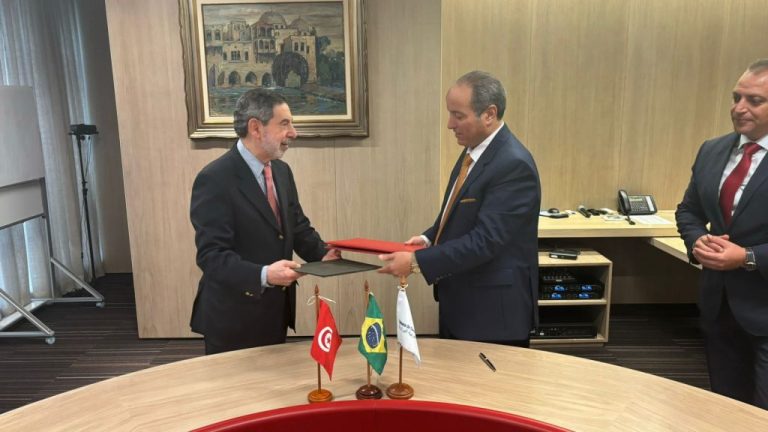São Paulo – The government of Tunisia decided to open an office in Brazil’s biggest city São Paulo to optimize trade promotion activities in Brazil and provide consular assistance to the Tunisian community in the city.
The space will be established in a building on Avenida Paulista and develop commercial activities with support from the Arab-Brazilian Chamber of Commerce (ABCC), as per the memorandum of understanding signed on Wednesday (15)’s morning between the institution and the Embassy of Tunisia in Brazil.
The office expands the network of consular and diplomatic representation from Tunisia in Brazil, with which the Arab country established bilateral relations in 1966, when it opened an embassy in Brasília, setting up later a network of honorary consuls in São Paulo, Brasília, and Rio de Janeiro to conduct trade promotion activities.
“Our new office aims to strengthen the existing cooperation between Tunisia and Brazil on a win-win basis,” said the country’s ambassador to Brazil, Nabil Lakhal, upon the signing of the document. He explained that the honorary consuls will keep working under the coordination of the Tunisian embassy, including in Santa Catarina, to which a consul from Tunisia will be appointed in the coming months.
Lakhal told ANBA he expects the new office will make it easier for Tunisian goods to enter Brazil, thus balancing out the trade between the two countries. Brazil-Tunisia trade ended last year at USD 447.7 million, up nearly 1% from the previous year, with Brazil exporting USD 379.7 million to the African country, which in turn sold just USD 63 million to Brazil.
This mismatch, however, has changed, Lakhal pointed out, as Tunisia has become a major exporter of olive oils and dates to the Brazilian retail, gaining more and more prominence in the Brazilian market due to actions in grocery retail fairs like the APAS Show in São Paulo. This year’s edition is hosting five Tunisian exhibitors of olive oil, dates, and sun-dried tomatoes.
The Tunisian ambassador added there is room to widen the cooperation in fertilizers, which are crucial to Brazilian agriculture production, particularly the phosphates that abound in Tunisia and are the only ones capable of correcting deficiencies in the soil of Cerrado. In 2023, Brazil imported 40.91 million tonnes of fertilizers to complement the national supply, of which Tunisia shipped 30,000 tonnes, up 53% more than in 2022.
He acknowledged a recent decline in shipments that derived from already solved issues and reassured that Tunisia is ready to resume the supply. According to him, in June his embassy and the ABCC will hold a mission to the African country consisting of representatives from Brazilian companies and government officials to discuss further cooperations and ensure a strategic supply of fertilizers to Brazil.
“It’ll be an opportunity for us to pick up this cooperation,” he said. “Tunisia is known as the producer of one of the world’s best phosphate fertilizers, as clients in Europe and Asia could confirm. Furthermore, production is carried out by state companies that are bound to carry out contracts with great predictability and legal certainty.”
Tunisia as a platform
The commercial office of Tunisia in São Paulo is also expected to help Brazilian companies going global to see the African country as an export platform to access relevant neighboring markets.
Tunisia has a free trade agreement signed with the European Union that was penned in 1995, giving the African country privileged access to a 500-million market with some of the highest per capita incomes in the world.
The office of Tunisia in Brazil could also make it easier for Brazilian companies to enter African markets, as it is integrated into the network of 12 diplomatic representations the country has across the African continent.
“The ABCC remains available to the Embassy of Tunisia for developing cultural and otherwise activities that strengthen the ties between the two countries,” said Osmar Chohfi, president of the institution upon the signing of the memorandum.
Report by Daniel Medeiros, especially for ANBA.
Translated by Guilherme Miranda




